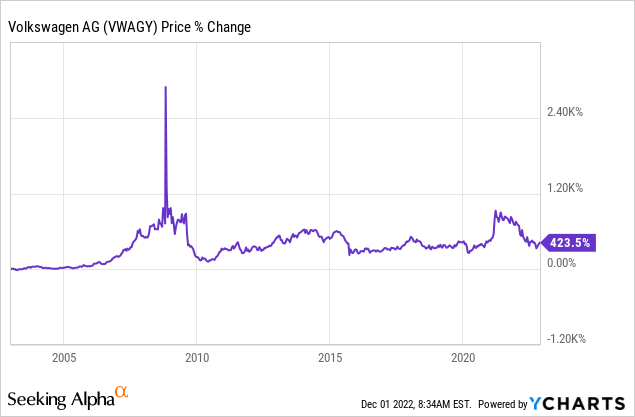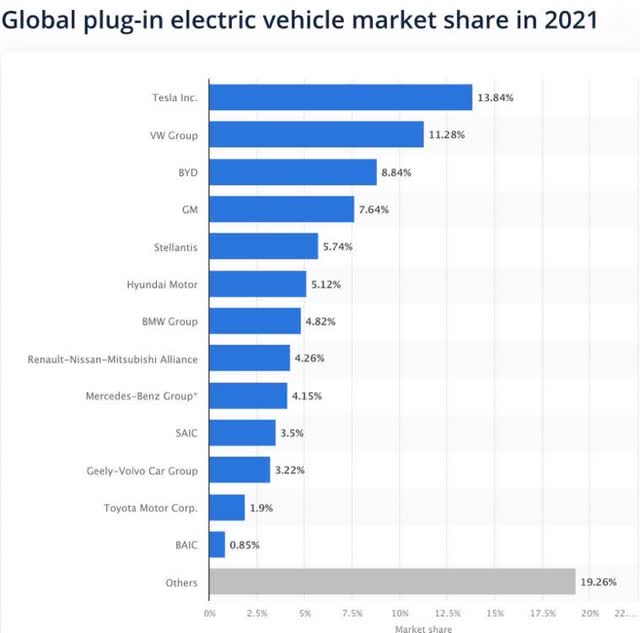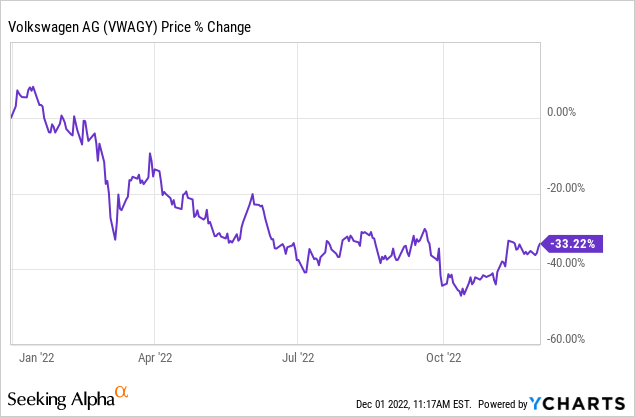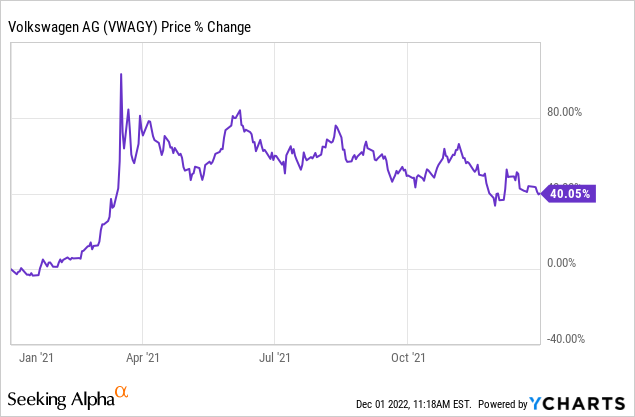This content represents the writer’s opinions and research and is not intended to be taken as financial advice. The information presented is general in nature and may not meet the specific needs of any individual or entity. It is not intended to be relied upon as a professional or financial decision-making tool.

Volkswagen’s stock is worth taking a look at right now. It is trading at a discount to its book value and is undervalued compared to its peers.
Naturally, since the stock seems like a viable EV play, investors are going to want to know how the price will move in the future. But based on the fundamentals of the company and its profitability, the stock is far more than an EV play.
In this article, we will discuss what analysts think about the stock, why their forecast underestimates the stock’s potential, what’s up with Volkswagen and the EV market, and much more…
Table of Contents
Business Overview of Volkswagen
Volkswagen AG, founded in 1937 and headquartered in Wolfsburg, Lower Saxony, Germany, is one of the world’s largest automakers.
More specifically, the company designs, develops, manufactures, and sells vehicles and engines. It sells passenger cars as well as commercial vehicles, including small vehicles with low consumption and luxury models
Among its brands are SEAT, Bentley, Scania, MAN, Ducati, Volkswagen, Audi, Volkswagen Skoda, Bugatti, and Lamborghini. Additionally, Volkswagen provides banking, insurance, leasing, and fleet management services.

Volkswagen (VOW) Stock Forecast 2023
Based on Wall Street’s 12-month median price target and the stock’s price, Volkswagen has a 4.32% upside. Frankly, this expectation seems a bit pessimistic but could be based on the market’s apparent indifference to Volkswagen’s stock in particular.
But the fundamentals of the company make the lowest price target of $11.88 look unreasonable. The highest price target of $29.49 captures the undervaluation of the stock and the business outlook much better.
Of course, these are all 12-month forecasts. This stock can yield good returns, but not until there’s a shift of attention by the market. And it’s anybody’s guess when this will happen.
But the market cannot ignore Volkswagen’s position in the market for long. Its efforts to be the leader in the electric vehicle market may soon lead it to capture a wider market share.
Not that it is currently very far left behind. Its share of the EV market in 2021 was reported by Teslarati as 11.28%. For context, Tesla had one of 13.84%.

Source: Teslarati
But that’s in the past. What about the future?
According to the company, it plans to increase Capex by almost 50% for e-mobility development. In total, $179 billion will be invested over the next five years.
An investment cannot be based on plans, however. We need to examine the car manufacturer’s financials…
First of all, let’s talk about stability. Volkswagen is obviously a financially healthy company. Its long-term debt is as much as its equity right now and, historically, its D/E ratio has decreased by 12.5%. Not only is this a very conservative capital structure, but it seems managers have maintained it so for a long time.
Speaking of the debt, it’s also pleasant to see that it’s serviceable. Based on the most recent annual report, Volkswagen’s operating earnings were 18 times its interest expense. And by the way, its interest coverage has increased by 10.25% over the last decade.
Now, its current ratio wasn’t very high at 1.2 times. However, it too has increased over the last decade (+13.1%).
Overall, this is a solvent car manufacturer and it’s really hard to see it having problems in the short to mid-term. But its profitability definitely helps in that regard too…
Volkswagen’s gross margin was last reported at 19.3%. For context, one of the company’s biggest competitors, Toyota Motor Corporation had a 17% gross margin. Ford Motor Corporation, another direct competitor, had a 15% one.
What’s more, Volkswagen increased its gross margin by 27.8% over the last decade. On the other hand, Toyota and Ford increased it by 12.6% and 4.3%, respectively. If this trend is maintained, we can see Volkswagen’s and its competitors’ margins widen even more.
When it comes to profit margins, Volkswagen’s competitors were more or less on the same level based on the latest reports. But Volkswagen has increased it by 667% over the last 10 years, while Toyota and Ford have increased their own by 550% and 154%, respectively.
Regarding revenue, Volkswagen managed to grow its annual sales by 285.4% in the last decade. In contrast, Toyota only increased it by 152.1% in the same period, while Ford’s sales shrank by 19.83%.
We also need to talk about net income. Volkswagen’s net annual earnings increased by 653.6% over the last 10 years. During the same period, Toyota and Ford increased theirs by 503.5% and 417.4%, respectively.
However, it’s Volkswagen’s free cash flow growth that is admirable here. While Toyota and Ford’s cash flows shrank by 76.4% and 98.56%, respectively, Volkswagen managed to grow its own by 185.6%.
There are obviously enough indicators to deem Volkswagen as a stable and profitable company that is especially competitive. However, whether it will succeed to come out on top when it comes to electric vehicles, that’s an entirely different story.
But the company’s current valuation is surprisingly very attractive compared to its competitors. So, it might be a more safe EV play. At worst, it’s a safe play for generating a stable dividend that is unlikely to be cut anytime soon (forward dividend yield 4.03%).
But let’s be more specific about why the company is undervalued…
First, its price is currently trading at 5.1 times its earnings per share. Toyota is trading at 9.9 times its EPS and Ford at 6.3x.
Volkswagen’s price also seems low in relation to its revenue with a P/S ratio of 0.34x. In contrast, Toyota and Ford are trading at 0.74 and 0.37 times their sales, respectively.
What’s more surprising, however, is the fact that the company’s market capitalization is half its equity right now (P/B: 0.56x). And though we could appreciate this one on its own, it’s interesting to know that Toyota and Ford are trading at 1.3 and 1 times their book value, respectively.
Volkswagen (VOW) Stock 2022

Despite reports that Volkswagen could soon steal Tesla’s EV market share, Volkswagen stock has had a mixed 2022. Since the beginning of the year, the stock has dropped almost 37%. VW announced in July 2021 that it would be all-electric in Europe by 2033. In response to President Joe Biden’s push for more electric vehicles, the company will also make “massive” changes to its US EV Program.
But we need to note that since opening at $178 in 2023, the stock has maintained a relatively stable downward trend, despite geoeconomic uncertainty and rising inflation.
Volkswagen (VOW) Stock 2021

2021 was obviously a good year for the stock. By the end of the year, it had gone up by 40%. As you can see from the graph above, that’s mostly thanks to a very steep price swing upwards.
Soon after Volkswagen announced it would use Microsoft’s cloud computing services in its self-driving car software, the price began to rise.
The CEO commented: “As we transform Volkswagen Group into a digital mobility provider, we are looking to continuously increase the efficiency of our software development. We are building the Automated Driving Platform with Microsoft to simplify our developers’ work through one scalable and data-based engineering environment. By combining our comprehensive expertise in the development of connected driving solutions with Microsoft’s cloud and software engineering know-how, we will accelerate the delivery of safe and comfortable mobility services.”
The stock went up by 53.26% in just the span of a week.
However, there were other notable price swings too:
- Dec. 07 – 08 (+11.72%)
Volkswagen shot up after German publication Handelsblatt reported that Porsche-Piech was considering selling a portion of its stake in the German auto giant. According to some analysts, the sale of the family’s stake could result in future share gains. - Mar. 22 (+12.56%)
VW’s stock price rose after Deutsche Bank said the company could be valued at the same level as Tesla and Nio.
- Mar. 18 (-15.07%)
The sell-off followed a series of announcements about a strategy for challenging Tesla in the electric vehicle market
Conclusion
Overall, Volkswagen’s stock can qualify for purchase on an investment basis. There are risks involved like with any investment, but this price’s attractiveness provides a margin of safety.
We can also not ignore its past profitability and present dedication to becoming the one that will dethrone Tesla. The market seems to have captured that possibility in 2021, but this year, the stock is in a downward trend towards “forgetting” both that dedication and its current position in the auto manufacturing market.
Only time will tell, but as you can see from the above indicators regarding Volkswagen’s fundamentals, the upside here is fairly attractive.
FAQ
Is Volkswagen a threat to Tesla?
Volkswagen is expected to overtake Tesla as the world’s largest producer of electric vehicles by 2024, according to new research. With new models such as the ID Buzz launching this year, the company is already the top EV manufacturer in Europe.
What’s the difference between VWAGY and VWAPY?
In short, both classes of shares are virtually identical from a financial standpoint. Voting rights are attached to VWAGY shares, which are relatively ‘overpriced’, but not to VWAPY shares. The two different stocks have different spreads.
Is Volkswagen a good stock to invest in?
Yes, Volkswagen can be a good pick for a stock portfolio if it’s bought at the current market price. It’s undervalued both in absolute terms and compared to competitors. The company has also been very profitable compared to its peers.
WeInvests is a financial portal-based research agency. We do our utmost best to offer reliable and unbiased information about crypto, finance, trading and stocks. However, we do not offer financial advice and users should always carry out their own research.
Read More







